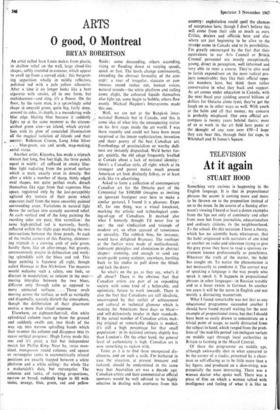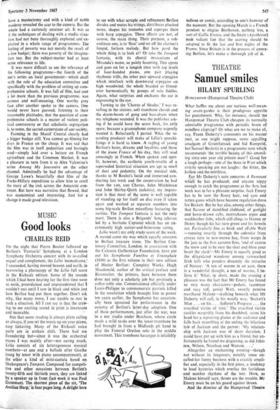At it again
TELEVISION STUART HOOD
Something very curious is happening to the English language. It is that in prepositional phrases the accent is coming more and more to be thrown on to the preposition instead of on to the noun. In the course of a Sunday after- noon's viewing I heard at least a dozen examples from the lips not only of continuity and other front men but from journalists, educationalists and ordinary citizens. In the neighbourhood. To the school. On this occasion. I have a theory, which has no scientific basis whatsoever, that the habit originated with narrators of one kind or another on radio and television trying to give the-grey prose they have to read a spurious ex- citement known professionally as punchiness. Whatever the truth of the matter, the habit has caught on. To notice the phenomenon is not necessarily to condemn it. The correct way of speaking a language is the way people who- speak it speak it. It happens in prepositional phrases in other languages—in Russian notably and to a lesser extent in German. In another ten years it will be the norm in English and not merely a distracting mannerism.
What I found remarkable was not that as one educational programme succeeded another I should have found myself waiting for the next example of prepositional stress, but that I should have been so easily drawn to concentrate on a trivial point of usage, so easily distracted from the subject in hand, which ranged from the prob- lems of `the mid-life period' (an inelegant variant on middle age) through local authorities in Britain to farming in the Massif Central.
Of these the programme on middle age, although awkwardly shot in what appeared to be the corner of a studio, presented by a chair- man so self-effacing as to be little more than a lay figure, and produced on a shoe-string, was potentially the most interesting. There was a woman doctor who spoke well. There was a piece of film on which a woman talked with intelligence and feeling of what it is like to
have a mastectomy and with a kind of noble modesty revealed the scar to the camera. But the whole had a curiously amateur air. It was as if the techniques of dealing with a studio situa- tion had not been thoroughly explored and ex- ploited in a whole range of programmes. The feeling of poverty was not merely the result of a low budget; there was poverty of the imagina- tion too. But the subject-matter had at least some relevance to life.
It was more difficult to see the relevance of the following programme—the fourth of the BBC'S series on local government—which dealt with the role of the education committee and specifically with the problem of setting up com- prehensive schools. It was full of film, had cost a lot more than the previous programme, was earnest and well-meaning. One worthy grey face after another spoke to the camera. One would, never have guessed, listening to their reasonable platitudes, that the question of com- prehensive schools is a matter of violent poli- tical controversy or that scholastic segregation is, to some, the sacred cornerstone of our society.
Farming in the Massif Central clearly had a bigger budget still. You cannot go filming for days in France on the cheap. It was sad that the film was in itself pedestrian and boringly used—simply laid over a lecture on French agriculture and the Common Market. It was a pleasure to turn from it to Alex Valentine's series Among My Souvenirs on the other channel. Admittedly he had the advantage of George Lowe's beautifully shot film of the Fuchs-Hilary expedition to allow him to retell the story of the trek across the Antarctic con- tinent. But here was narrative that flowed, that was economical and interesting. Just for a change it made good television.











































 Previous page
Previous page